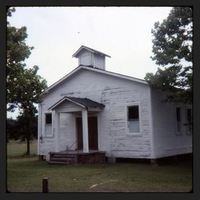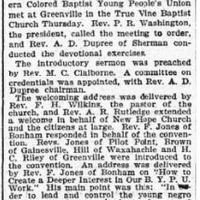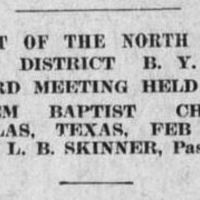African American Baptists
After the Civil War, the number of African American Baptists rose dramatically throughout the South, claiming more than 1.3 million active members by 1890, surpassing every predominantly African American church denomination. The Baptist Church was particularly attractive to African American freedmen and women because the Baptist Church tended to be less centralized and allowed more autonomy than other American church denominations like the Methodist or Catholic Churches. Furthermore, egalitarian ideas about redemption and baptism by total immersion, and that salvation for all who repented their sins were also attractive prospects. Southern Baptists, including African Americans and whites tended to hold more unconventional styles of worship, such as conducting baptisms in creeks or rivers to dramatize the sinner's spiritual death and rebirth as a Christian. Singing, shouting, and vocal interactions with preachers also expressed the informality of Baptist congregations.
During the late nineteenth and early twentieth centuries in Denton County, African American Baptist churches outnumbered the other predominantly African American denomination. There were at least five active African American churches in the Denton County area during this time period, including: St Emmanuel Missionary Baptist, in Denton; Pleasant Grove Baptist, in Denton; St. John’s Baptist, in Pilot Point; St. James Baptist, north of Pilot Point; and County Line Baptist, in Pilot Point. These churches often interacted with one another in the community through church related activities and hosted community events. For example, in 1919, County Line Baptist offers thanks to their “sister churches” St. John’s Baptist and St. James Baptist for helping raise money in a rally that County Line Baptist hosted. The Baptist churches in Denton County also attended Baptist-led conferences including Baptist Youth People’s Union (B.Y.P.U.), which members from St. John’s Baptist attended in 1920, in Dallas, Texas. Denton County Baptist preachers and church members also attended teaching conferences regarding African American youth in North Texas towns, including Sherman and Greenville at the turn of the twentieth century. Charles C. Trimble, a teacher and a preacher from Pilot Point attended several of these conferences reported by the Dallas Morning News. Lastly, a few African Americans from Denton County attended Bishop College, a Baptist-sponsored college organized in 1881, in Marshall, Texas.
News coverage
BYPU Meeting (1920)
This a map of North Texas African American Baptist churches that attended a BYPU meeting at Salem Baptist Church, in Dallas. St. John's Baptist Church of Pilot Point was one of the North Texas churches that attended the event.
Citations: C. Eric Lincoln and Lawrence H. Mamiya, The Black Church in the African American Experience (Durham: Duke University Press, 1990), 20; Handbook of Texas Online, William E. Montgomery, "African-American Churches," http://www.tshaonline.org/handbook/online/articles/pkatz. Uploaded on June 9, 2010. Published by the Texas State Historical Association; Edward L. Ayers, Promise of the New South: Life After Reconstruction (New York: Oxford University Press, 2007), 160; Ibid; The Dallas Express (Dallas, Tex.), Vol. 27, No. 5, Ed. 1 Saturday, November 8, 1919, newspaper, November 8, 1919; Dallas, Texas. (texashistory.unt.edu/ark:/67531/metapth278285/m1/9/?q=pilot%20point: University of North Texas Libraries, The Portal to Texas History, texashistory.unt.edu;




